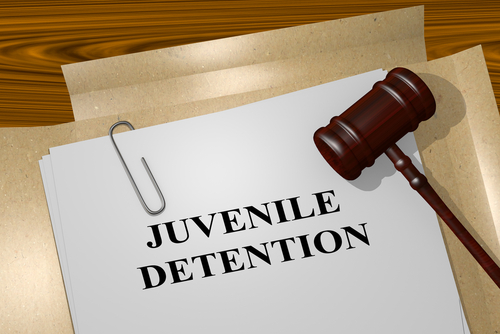THE FACTS
Maria Rivera filed a Chapter 7 case in the Santa Ana Division of the bankruptcy court. She included among her debts $9,905 owed to the Orange County Probation Department for costs related to her son’s involuntary juvenile detention.
Rivera had not responded to a court order requiring her to meet with a county official to determine her ability to pay the assessed costs, originally $16,372. But she paid almost half of it when she sold her home. Orange County then sent her additional statements about the remaining balance due, and a final notice requiring her to appear at a juvenile court hearing to determine her ability to pay. When Rivera did not appear, the court entered a judgment of $9,905 against her.
Rivera filed her Chapter 7 case less than two months later. Orange County received a notice and did not respond or object. About four months later the bankruptcy judge entered a court order discharging (legally writing off) all of Rivera’s dischargeable debts. Soon after that Orange County started again sending her statements of the balance due, and a representative called her trying to collect.
Creditors are forbidden from attempting to collect a debt that has been discharged in bankruptcy. So Rivera’s lawyer filed a motion alleging that Orange County had violated the discharge and should be punished.
After two hearings and initially a tentative decision in favor of Rivera, Bankruptcy Judge Theodor Albert eventually decided that Rivera could not discharge the debt to Orange County, she continued to owe the $9,905, and so the County did not violate the discharge.
WHY DID THIS JUDGE DECIDE THAT THE DEBTOR MUST STILL PAY THE DEBT?
Most debts can be discharged in bankruptcy. Child support debts can’t be. The judge decided that the debt Rivera owed to the Orange County Probation Department for costs related to her son’s involuntary juvenile detention amounted to child support.
This makes more sense than may first appear. California law allows the government to require parents of juvenile detainees to pay for up to $30 per day “for the reasonable costs of support of the minor while the minor” is in juvenile detention. CAL. WELF. & INST. CODE § 903(a). According to the county’s Probation Department the total daily incarceration cost is about $420 per day. Of that, by law the County can require the parents to pay only the “costs of support,” defined as “only actual costs incurred by the county for food and food preparation, clothing, personal supplies, and medical expenses.” CAL. WELF. & INST. CODE § 903(c). The County determined that was $23.90 per day, from which it calculated the debt.
DOES BANKRUPTCY LAW CONSIDER A DEBT OWED TO A GOVERNMENTAL AGENCY, FOR LIVING EXPENSES UNRELATED TO A SEPARATION OR DIVORCE, TO BE CHILD SUPPORT?
That’s the heart of the issue. Bankruptcy law states that you cannot discharge a “domestic support obligation.” But what does that include?
The U.S. Bankruptcy Code says directly that a bankruptcy discharge “does not discharge an individual debtor from any debt—for a domestic support obligation.” § 523(a)(5) of the Bankruptcy Code.
“Domestic support obligation” is defined (§ 101(14A)), for purposes of the facts here, as a debt:
- “owed to . . . a spouse, former spouse, or child of the debtor . . . or a governmental unit”
- “in the nature of alimony, maintenance, or support (including assistance provided by a governmental unit)”
There’s no debate that the debt here was “owed to . . . a governmental unit.” The question is whether “costs incurred by the county for food and food preparation, clothing, personal supplies, and medical expenses” are “in the nature of alimony, maintenance, or support (including assistance provided by a governmental unit).”
SO ISN’T IT PRETTY STRAIGHTFORWARD THAT THE “SUPPORT” “PROVIDED BY ORANGE COUNTY IS A “DOMESTIC SUPPORT ORDER”?
It’s not that straightforward. The situation is complicated by the fact that some courts had decided earlier that obligations of parents for living expenses of their minor children in juvenile institutions are not “in the nature of alimony, maintenance, or support.” But then in the meantime both the relevant California and bankruptcy statutes have been amended. So one challenge is in figuring whether the new wording of the statutes changes the result.
Bankruptcy Judge Albert at first thought that Orange County’s costs were not “domestic support obligations,” but was persuaded that they were and so ruled in favor of the County.
When Rivera appealed to the Bankruptcy Appellate Panel (“BAP”), the three judges there agreed with Judge Albert. See In re Maria Rivera. They believed that the changes in the statutes had expanded the definition of domestic support obligations to include the debt to the county.
They said that because of the changed language of the relevant statutes, “we are not bound to apply our [earlier] case law deciding that a debt owed to a county for the expenses of incarcerating the debtor’s child is dischargeable in bankruptcy.” “Instead, by applying the plain language of amended [statutes cited above], we conclude that the debt . . . to Orange County is excepted from discharge as a domestic support obligation.” Rivera had to pay the debt.
So Rivera appealed again, this time to the U.S. Ninth Circuit Court of Appeals.
WHY WOULD RIVERA APPEAL AGAIN, AFTER THE INITIAL JUDGE, AND NOW THREE MORE ON THE BAP, HAD ALL RULED AGAINST HER?
Rivera and her lawyer apparently believed that a debt to reimburse her son’s living expenses while incarcerated was just not “in the nature of alimony, maintenance, or support.” So they were willing to keep fighting. And fortunately for them, and for others in California in similar situations, the third time was the charm.
You Might Also Be Interested In...
The Ninth Circuit panel ruled strongly in Rivera’s favor. See Rivera v. Orange County Probation Dept.
It cast the question like this: “whether debts owed to government units that are not part of the government’s family support infrastructure, and specifically debts to a Probation Department for costs related to a juvenile’s detention, are ‘in the nature of . . . support,’ and thus are [domestic support obligations].”
The court’s rationale included:
- The changes in the bankruptcy statutes “changed only the parties who could qualify as creditors to whom a [domestic support obligation] was owed, not the definition or nature of family support itself.”
- “The ‘support’ that the Probation Department provided to Rivera’s son in the course of his detention was incidental to . . . its larger governmental purpose” of “enforc[ing] the criminal law,” not “to improve the child’s ‘domestic’ circumstances.”
- Debts to governmental entities for foster care and state wardship expenses are different. They ARE domestic support obligations, as prior court decisions have shown, because such expenses are in the nature of domestic support.
- The County’s “support” expenses while in juvenile detention were for Rivera’s son’s basic needs, “but that is not sufficient to make an obligation a “domestic support order.” Otherwise credit card debts or retailers’ accounts which happen to be for purchases of children’s food or clothing would be debts “in the nature of support,” which they clearly are not.
- Because “juvenile detention serves not domestic but correctional ends,” “Rivera’s debt is not a domestic support obligation and thus not excepted from discharge.”
DID THE COURT OF APPEALS SAY ANYTHING ELSE NOTEWORTHY?
In a 3-page conclusion, the author of the opinion, Circuit Judge Stephen Reinholdt, very directly criticized Orange County for its behavior. He shared some of his concerns about this case:
- “Rivera’s case is troubling, however, because the County’s actions compromise the goals of juvenile correction and the best interests of the child, and, ironically, impair the ability of his mother to provide him with future support.”
- “Orange County’s public budget shows that the Probation Department relies on self-generated revenue for more than 40% of its financing. Seeking to obtain that revenue by unremittingly pursuing legal actions against disadvantaged individuals – the counterproductive practice at issue here – can have damaging effects on the community.” It “undermines the credibility of government and the perceived integrity of the legal process.”
- “We would hope that in the future the County will exercise its discretion in a way that protects the best interests of minors and the society they will join as adults, instead of following a directly opposite and harmful course.”
- Judge Reinholdt noted in a final footnote that another county, Alameda County in the San Francisco Bay Area, chose a few month ago “to end the collection of juvenile probation fees” under the same California statute used here by Orange County.




